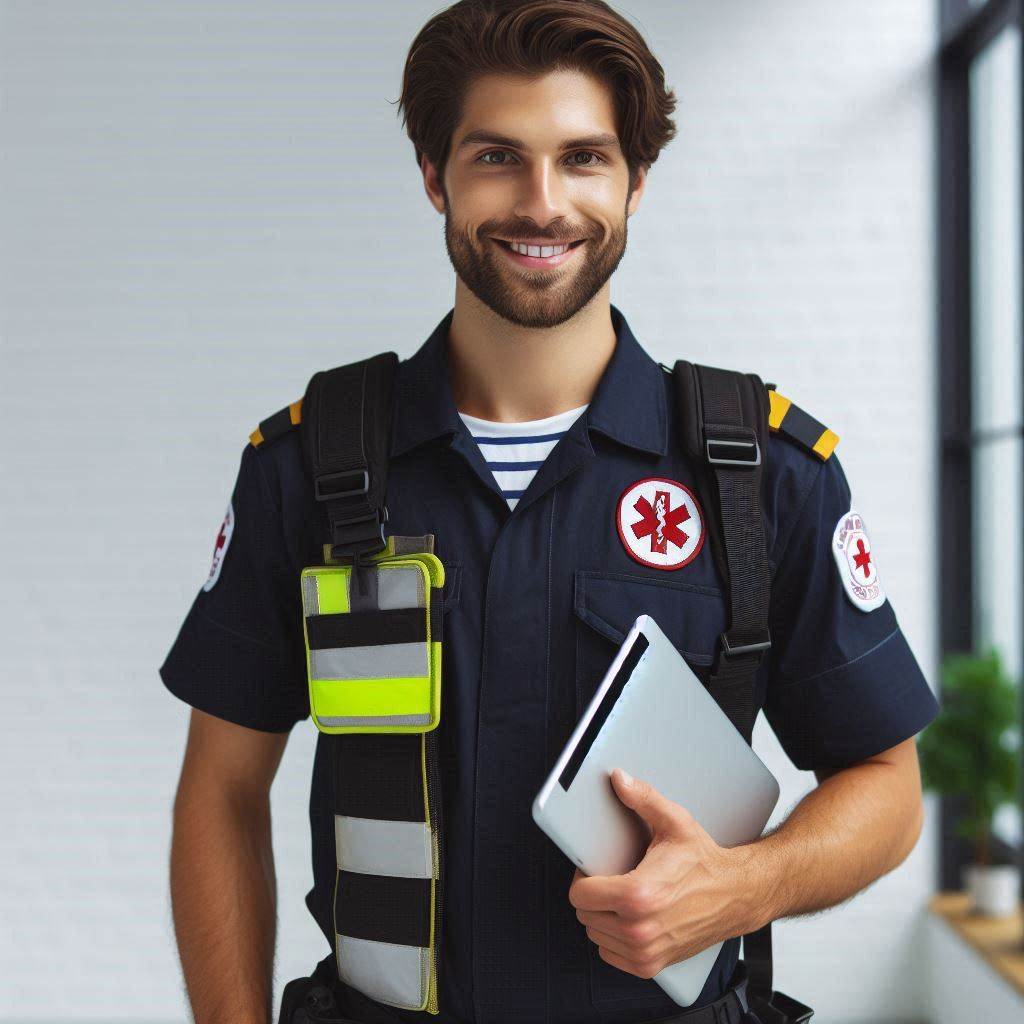Introduction
Paramedics play a crucial role in public health by providing emergency medical care. Their quick response can make a significant impact on saving lives.
Paramedics are often the first healthcare professionals on the scene of emergencies, providing immediate medical assistance.
Paramedics are trained to assess, treat, and stabilize patients in critical conditions before they reach the hospital.
Their actions can greatly impact patient outcomes.
Paramedics’ ability to quickly respond to emergencies can mean the difference between life and death. Their swift actions are critical in saving lives.
Paramedics also play a role in promoting public health through community education and outreach programs.
They help prevent emergencies by raising awareness about safety and health issues.
Paramedics work closely with other healthcare professionals, ensuring a seamless continuum of care for patients.
This collaboration improves health outcomes and promotes overall public health.
Paramedics are unsung heroes in public health, providing essential emergency medical care and promoting health and safety within communities.
Their impact is truly invaluable.
History of Paramedics
Background information on the history of paramedics
Paramedics have a rich history dating back to the early 1900s.
During World War I, the concept of field medics treating injured soldiers emerged.
Paramedics evolved from ambulance drivers trained in basic first aid to highly skilled medical professionals.
Evolution of Paramedics
In the 1960s, advancements in medical technology and training led to the modern paramedic role.
Paramedics were equipped with life-saving skills such as administering medication and performing CPR.
Today, paramedics play a crucial role in pre-hospital care and emergency medical services.
Key Milestones in Paramedic Services
The establishment of the National Registry of Emergency Medical Technicians in 1970 standardized paramedic training.
The introduction of advanced life support protocols in the 1980s improved patient outcomes.
Technological advancements, such as portable defibrillators, have enhanced paramedic capabilities in the field.
Transform Your Career Today
Unlock a personalized career strategy that drives real results. Get tailored advice and a roadmap designed just for you.
Start NowBy understanding the history, evolution, and key milestones of paramedic services, we can appreciate the vital role paramedics play in public health today.
Read: Salary Expectations for Paramedics in the USA
Roles and Responsibilities of Paramedics
Different roles and responsibilities of paramedics
Paramedics play a crucial role in providing emergency medical care to individuals in need.
They are trained professionals who can administer life-saving treatments in critical situations.
Paramedics are responsible for assessing patients’ conditions and providing appropriate medical interventions.
They must have a thorough understanding of medical protocols and procedures to ensure accurate diagnosis and treatment.
Paramedics work closely with other healthcare professionals to coordinate patient care and transfer patients to medical facilities.
In emergency medical situations, paramedics must remain calm under pressure and make quick decisions to save lives.
They are trained to handle a wide range of medical emergencies, from cardiac arrests to trauma injuries.
Paramedics must communicate effectively with patients, family members, and hospital staff to ensure continuity of care.
Their primary goal is to stabilize patients and provide initial treatment before transporting them to a medical facility.
Paramedics often work in high-stress environments, where every decision can have a significant impact on patient outcomes.
How Paramedics Respond to Emergency Medical Situations
Paramedics are usually dispatched to emergency scenes through 911 calls or other communication channels.
Upon arriving at the scene, paramedics quickly assess the situation and triage patients based on their conditions.
They prioritize critical patients who require immediate medical attention to maximize survival chances.
Paramedics perform initial assessments, administer necessary medications, and provide life-saving interventions as needed.
They work efficiently to stabilize patients and prepare them for transportation to a medical facility.
Paramedics collaborate with other emergency responders, such as firefighters and police, to ensure a coordinated response.
In some cases, paramedics may need to perform advanced procedures, such as intubation or administering IV medications.
Showcase Your Business Today
Reach thousands of readers actively exploring professional services. Publish your business profile and grow your audience now.
Publish NowParamedics must document all interventions and patient assessments accurately for continuity of care.
They work under the guidance of medical control protocols and consult with physicians for complex cases.
Paramedics are prepared to adapt to changing situations and make quick decisions to optimize patient outcomes.
The Importance of Paramedics in Providing Timely and Effective Care
Paramedics are often the first healthcare providers to arrive at the scene of a medical emergency.
Their quick response time can make a significant difference in the outcome of a patient’s condition.
Paramedics are trained to provide immediate care that can prevent complications and save lives.
They play a vital role in stabilizing patients before they reach a hospital for further treatment.
Paramedics’ ability to assess and intervene in emergencies can reduce morbidity and mortality rates.
Timely interventions by paramedics can improve survival rates for patients experiencing cardiac arrest or severe trauma.
Their presence at the scene ensures that patients receive necessary medical attention promptly.
Paramedics’ proficiency in performing life-saving procedures can make a difference in critical situations.
They work tirelessly to ensure that patients receive the best possible care in challenging circumstances.
The dedication and expertise of paramedics contribute significantly to public health by providing essential emergency medical services.
Read: Essential Equipment Used by Paramedics
Paramedics in Disaster Response
During times of disaster and crisis, paramedics play a crucial role in providing emergency medical care and response.
Their expertise and quick thinking can often make the difference between life and death for those affected.
Let’s explore the vital role of paramedics in disaster response:
Role of paramedics in disaster response and emergency preparedness
Paramedics are frontline responders during emergencies, providing medical care to those in need.
They are trained to assess and treat patients quickly and efficiently, even in high-stress situations.
Moreover, during mass casualty incidents such as car accidents or terrorist attacks, paramedics are essential in providing rapid and organized medical care to a large number of victims.
Their quick response can prevent further loss of life and alleviate suffering.
Working Alongside Other Healthcare Professionals
In times of crisis, paramedics collaborate with various healthcare professionals such as doctors, nurses, and emergency medical technicians.
This teamwork ensures that patients receive comprehensive and timely care.
Furthermore, paramedics are equipped with specialized medical equipment and medications to treat a wide range of conditions and injuries.
Their expertise in pre-hospital care is invaluable in stabilizing patients before they reach a hospital for more advanced treatment.
Saving Lives During Natural Disasters and Mass Casualty Incidents
Paramedics play a critical role in saving lives during natural disasters like hurricanes, earthquakes, and floods.
They triage and treat individuals with injuries, ensuring that those in critical condition receive immediate attention.
Paramedics are trained to remain calm under pressure and act swiftly to assess the situation, prioritize treatment, and transport patients to hospitals or emergency care centers.
They are skilled in administering life-saving interventions such as CPR, airway management, and hemorrhage control.
In addition to providing immediate medical care, paramedics also play a role in disaster preparedness and response planning.
They participate in drills, exercises, and simulations to ensure they are well-prepared to handle various emergency scenarios.
Paramedics are often the first healthcare professionals to arrive at the scene of an emergency, making their role in disaster response crucial.
They work tirelessly to save lives, alleviate suffering, and provide comfort to those in distress.
In short, paramedics are unsung heroes in times of disaster and crisis.
Their dedication, skills, and bravery are essential in protecting public health and safety during emergencies.
The impact of paramedics on public health cannot be overstated, as they are truly lifesavers in times of need.
Read: Advancing Your Career as a Paramedic

Public Health Initiatives by Paramedics
Paramedics play a crucial role in public health initiatives by actively engaging in promoting health education and disease prevention within communities.
They are at the frontline of healthcare, providing essential services that go beyond emergency response.
Various Public Health Initiatives Led by Paramedics
- Community Health Assessment: Paramedics conduct regular assessments to identify health needs and risks within communities.
- Educational Workshops: They organize workshops on CPR, first aid, and other essential health topics to empower individuals.
- Vaccination Drives: Paramedics participate in vaccination campaigns to increase immunization rates and prevent outbreaks.
- Home Visits: They visit patients at home to provide post-discharge care and ensure medication compliance.
Promotion of Health Education and Disease Prevention
- Paramedics engage in community outreach to raise awareness about preventive healthcare measures.
- They collaborate with schools and organizations to educate the public on healthy lifestyle choices.
- Paramedics participate in public health fairs and events to disseminate information on disease prevention.
- They provide resources and referrals to individuals for accessing healthcare services and support.
Impact of Paramedics in Addressing Public Health Challenges
- Opioid Overdoses: Paramedics are trained to administer naloxone and provide immediate care to overdose victims.
- Mental Health Crises: They offer crisis intervention and refer individuals to mental health resources for treatment.
- Chronic Disease Management: Paramedics support patients with chronic conditions in managing their health and medications.
- Disaster Response: They play a vital role in disaster response efforts by providing medical triage and care.
Overall, paramedics serve as public health advocates who work tirelessly to improve community well-being and address public health challenges effectively.
Showcase Your Business Today
Reach thousands of readers actively exploring professional services. Publish your business profile and grow your audience now.
Publish NowRead: Common Challenges Faced by Paramedics Today
Paramedics in Community Health Care
Role of paramedics in providing community-based healthcare services
Paramedics fulfill a crucial role in community-based healthcare by offering immediate medical care outside traditional hospital settings.
They respond to emergencies in homes, schools, and public spaces, providing critical interventions such as CPR, wound care, and stabilization of patients until they reach medical facilities.
This proactive approach enhances community health by addressing medical emergencies swiftly, potentially saving lives and minimizing long-term health complications.
Moreover, paramedics educate communities on preventive health measures, empowering individuals to manage chronic conditions and prevent emergencies.
How paramedics collaborate with local clinics and social services to support underserved populations
Paramedics collaborate closely with local clinics and social services to support underserved populations effectively.
They serve as a link between emergency care and ongoing medical support, ensuring continuity of care for vulnerable groups.
By coordinating with clinics, paramedics facilitate referrals for follow-up care and rehabilitation, addressing broader health needs beyond immediate emergencies.
This partnership also enables paramedics to advocate for resources and services tailored to the specific health challenges faced by underserved communities, fostering sustainable health improvement initiatives.
Importance of paramedics in improving access to healthcare in rural and urban areas
Paramedics play a vital role in improving healthcare access in both rural and urban areas.
In rural settings, they provide essential emergency services that may be otherwise inaccessible due to geographical barriers.
By responding quickly to emergencies in remote locations, paramedics mitigate the impact of distance on health outcomes, potentially stabilizing patients before they reach hospitals.
In urban areas, paramedics alleviate strain on emergency rooms by handling non-life-threatening emergencies on-site, thus optimizing healthcare resources and reducing wait times for critical cases.
Overall, their presence ensures equitable access to timely medical care, contributing significantly to public health outcomes across diverse geographic settings.
Training and Education for Paramedics
The training and education required to become a paramedic
To become a paramedic, individuals must complete a rigorous training program.
This training typically includes coursework in anatomy, physiology, medical terminology, and emergency procedures.
Paramedics also undergo clinical rotations in hospitals and ambulance settings to gain real-world experience.
This hands-on training is essential for preparing paramedics to respond effectively in emergency situations.
Certification and licensure process for paramedics
Once the education and training requirements are met, paramedics must obtain certification.
This certification is typically achieved through passing the National Registry of Emergency Medical Technicians (NREMT) exam.
In addition to certification, paramedics must also obtain state licensure.
Licensure requirements vary by state but usually involve completing an application, paying a fee, and passing a background check.
Ongoing professional development opportunities available to paramedics
Ongoing professional development is crucial for paramedics to stay current in their field.
Continuing education opportunities, such as conferences, workshops, and online courses, help paramedics stay up-to-date on the latest advancements in emergency medical care.
Some paramedics may choose to pursue additional certifications or specializations.
These certifications, such as advanced cardiac life support (ACLS) or pediatric advanced life support (PALS), can enhance a paramedic’s skills and qualifications.
Paramedics may also participate in mentorship programs or seek out opportunities for skill-building.
By continually learning and improving their abilities, paramedics can provide the best possible care to their patients.
Conclusion
Paramedics play a crucial role in ensuring public health and safety by providing emergency medical care.
They respond to a wide range of medical emergencies, from heart attacks to car accidents, saving lives in the process.
Paramedics are highly trained professionals who are skilled in handling critical situations with efficiency and expertise.
Their quick response and ability to stabilize patients before they reach the hospital are vital in improving outcomes.
By working closely with hospitals and other healthcare providers, paramedics help streamline the continuum of care for patients.
It is important for communities to recognize and appreciate the hard work and dedication of paramedics in saving lives.
Supporting paramedics through funding, resources, and training opportunities is crucial for enhancing public health outcomes.
Paramedics are unsung heroes who play a significant role in maintaining the health and well-being of society.
Let us all show our gratitude and support for the invaluable work that paramedics do in our communities.
[E-Books for Sale]
The Big Book of 500 High-Paying Jobs in America: Unlock Your Earning Potential
$19.99 • 500 High-Paying Jobs • 330 pages
Explore 500 high-paying jobs in America and learn how to boost your career, earn more, and achieve success!
See All 500 High-Paying Jobs of this E-Book
1001 Professions Without a Degree: High-Paying American Jobs You Can Start Now
$19.99 • 1001 Professions Without a Degree • 174 pages
Discover 1001 high-paying jobs without a degree! Unlock career tips, skills, and success strategies for just $19.99!




